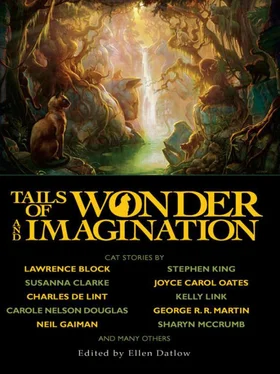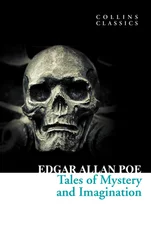Ellen Datlow - Tails of Wonder and Imagination
Здесь есть возможность читать онлайн «Ellen Datlow - Tails of Wonder and Imagination» весь текст электронной книги совершенно бесплатно (целиком полную версию без сокращений). В некоторых случаях можно слушать аудио, скачать через торрент в формате fb2 и присутствует краткое содержание. Год выпуска: 2010, ISBN: 2010, Издательство: Night Shade Books, Жанр: Фэнтези, Фантастика и фэнтези, Ужасы и Мистика, на английском языке. Описание произведения, (предисловие) а так же отзывы посетителей доступны на портале библиотеки ЛибКат.
- Название:Tails of Wonder and Imagination
- Автор:
- Издательство:Night Shade Books
- Жанр:
- Год:2010
- ISBN:978-1-59780-170-6
- Рейтинг книги:5 / 5. Голосов: 1
-
Избранное:Добавить в избранное
- Отзывы:
-
Ваша оценка:
- 100
- 1
- 2
- 3
- 4
- 5
Tails of Wonder and Imagination: краткое содержание, описание и аннотация
Предлагаем к чтению аннотацию, описание, краткое содержание или предисловие (зависит от того, что написал сам автор книги «Tails of Wonder and Imagination»). Если вы не нашли необходимую информацию о книге — напишите в комментариях, мы постараемся отыскать её.
collects the best of the last thirty years of science fiction and fantasy stories about cats from an all-star list of contributors.
Tails of Wonder and Imagination — читать онлайн бесплатно полную книгу (весь текст) целиком
Ниже представлен текст книги, разбитый по страницам. Система сохранения места последней прочитанной страницы, позволяет с удобством читать онлайн бесплатно книгу «Tails of Wonder and Imagination», без необходимости каждый раз заново искать на чём Вы остановились. Поставьте закладку, и сможете в любой момент перейти на страницу, на которой закончили чтение.
Интервал:
Закладка:
The Principal tried to brush the news aside. “When it’s time to climb a tree, you climb a tree,” he said. “Any cat knows that.” (He had become quite fond of Gordon, in his way.)
It wasn’t enough. The Assistant Professor of Tailchasing (a chocolate-point Siamese who dreamed of one day heading the school himself) led the opposition. As the Assistant Professor saw it, Gordon was plainly a fraud, a pretender, a cat in card only, so friendly with his fellow mice that they had rushed to help him when he was in danger. In light of that, who could say what Gordon’s real plans might be? Why had he come to the school in the first place? What if more like him followed? What if the mice were plotting to attack the cat school, all cat schools?
This thought rattled everyone at the table. With a mouse like Gordon in their midst, a mouse who knew far more about being a cat than the cats themselves, was any feline safe?
Just that quickly, fear replaced reason. Within minutes everyone but the Principal forgot how much they had liked and admired Gordon. Admitting him to the school had been a catastrophic mistake, one that must be set right without a moment’s delay!
The Principal groaned and covered his eyes and sent for Gordon. He was almost crying as he took Gordon’s cat card away.
Gordon protested like mad, of course. He spoke of Will and Choice, and Freedom, and the transforming power of Questioning Assumptions. But the Principal said sadly, “We just can’t trust you, Gordon. Go away now, before I eat you myself. I always wondered what you’d taste like.” Then he put his head down on his desk and really did begin to cry.
So Gordon packed his clean shirt and his leftover peanut butter and left the cat school. All the cats formed a double line to let him pass, their faces turned away, and nobody said a word. The Assistant Professor of Tailchasing was poised to pounce at the very last, but the Principal stepped on his tail.
Nobody ever heard of Gordon again. There were stories that he’d gone right on being a cat, even without his card; and there were other tales that said he had been driven out of the country by the mice themselves. But only the Principal knew for sure, because only the Principal had heard the words that Gordon was muttering to himself as he walked away from the cat school with his head held high.
“Woof,” Gordon was murmuring thoughtfully. “Woof. Bow-wow. Shouldn’t be too hard.”
THE JAGUAR HUNTER
Lucius Shepard
Lucius Shepard was born in Lynchburg Virginia, grew up in Daytona Beach, Florida, and lives in Portland, Oregon. His short fiction has won the Nebula Award, the Hugo Award, the International Horror Guild Award, the National Magazine Award, the Locus Award, the Theodore Sturgeon Award, and the World Fantasy Award. His most recent books are a short fiction collection, Viator Plus and a short novel, The Taborin Scale. Forthcoming are another short fiction collection, Five Autobiographies , and two novels, tentatively titled The Piercefields and The End Of Life As We Know It , and a short novel, The House of Everything and Nothing .
“The Jaguar Hunter” is based on a story told to Shepard in a bar in Telas, Honduras by an old and very drunk man.
It was his wife’s debt to Onofrio Esteves, the appliance dealer, that brought Esteban Caax to town for the first time in almost a year. By nature he was a man who enjoyed the sweetness of the countryside above all else; the placid measures of a farmer’s day invigorated him, and he took great pleasure in nights spent joking and telling stories around a fire, or lying beside his wife, Incarnación. Puerto Morada, with its fruit-company imperatives and sullen dogs and cantinas that blared American music, was a place he avoided like the plague; indeed, from his home atop the mountain whose slopes formed the northernmost enclosure of Bahía Onda, the rusted tin roofs ringing the bay resembled a dried crust of blood such as might appear upon the lips of a dying man.
On this particular morning, however, he had no choice but to visit the town. Incarnación had—without his knowledge—purchased a battery-operated television set on credit from Onofrio, and he was threatening to seize Esteban’s three milk cows in lieu of the eight hundred lempiras that was owed; he refused to accept the return of the television, but had sent word that he was willing to discuss an alternate method of payment. Should Esteban lose the cows, his income would drop below a subsistence level and he would be forced to take up his old occupation, an occupation far more onerous than farming.
As he walked down the mountain, past huts of thatch and brushwood poles identical to his own, following a trail that wound through sun-browned thickets lorded over by banana trees, he was not thinking of Onofrio but of Incarnación. It was in her nature to be frivolous, and he had known this when he had married her; yet the television was emblematic of the differences that had developed between them since their children had reached maturity. She had begun to put on sophisticated airs, to laugh at Esteban’s country ways, and she had become the doyenne of a group of older women, mostly widows, all of whom aspired to sophistication. Each night they would huddle around the television and strive to outdo one another in making sagacious comments about the American detective shows they watched; and each night Esteban would sit outside the hut and gloomily ponder the state of his marriage. He believed Incarnación’s association with the widows was her manner of telling him that she looked forward to adopting the black skirt and shawl, that—having served his purpose as a father—he was now an impediment to her. Though she was only forty-one, younger by three years than Esteban, she was withdrawing from the life of the senses; they rarely made love anymore, and he was certain that this partially embodied her resentment to the fact that the years had been kind to him. He had the look of one of the Old Patuca—tall, with chiseled features and wide-set eyes; his coppery skin was relatively unlined and his hair jet black. Incarnación’s hair was streaked with gray, and the clean beauty of her limbs had dissolved beneath layers of fat. He had not expected her to remain beautiful, and he had tried to assure her that he loved the woman she was and not merely the girl she had been. But that woman was dying, infected by the same disease that had infected Puerto Morada, and perhaps his love for her was dying, too.
The dusty street on which the appliance store was situated ran in back of the movie theater and the Hotel Circo del Mar, and from the inland side of the street Esteban could see the bell towers of Santa María del Onda rising above the hotel roof like the horns of a great stone snail. As a young man, obeying his mother’s wish that he become a priest, he had spent three years cloistered beneath those towers, preparing for the seminary under the tutelage of old Father Gonsalvo. It was the part of his life he most regretted, because the academic disciplines he had mastered seemed to have stranded him between the world of the Indian and that of contemporary society; in his heart he held to his father’s teachings—the principles of magic, the history of the tribe, the lore of nature—and yet he could never escape the feeling that such wisdom was either superstitious or simply unimportant. The shadows of the towers lay upon his soul as surely as they did upon the cobbled square in front of the church, and the sight of them caused him to pick up his pace and lower his eyes.
Farther along the street was the Cantina Atómica, a gathering place for the well-to-do youth of the town, and across from it was the appliance store, a one-story building of yellow stucco with corrugated metal doors that were lowered at night. Its façade was decorated by a mural that supposedly represented the merchandise within: sparkling refrigerators and televisions and washing machines, all given the impression of enormity by the tiny men and women painted below them, their hands upflung in awe. The actual merchandise was much less imposing, consisting mainly of radios and used kitchen equipment. Few people in Puerto Morada could afford more, and those who could generally bought elsewhere. The majority of Onofrio’s clientele were poor, hard-pressed to meet his schedule of payments, and to a large degree his wealth derived from selling repossessed appliances over and over.
Читать дальшеИнтервал:
Закладка:
Похожие книги на «Tails of Wonder and Imagination»
Представляем Вашему вниманию похожие книги на «Tails of Wonder and Imagination» списком для выбора. Мы отобрали схожую по названию и смыслу литературу в надежде предоставить читателям больше вариантов отыскать новые, интересные, ещё непрочитанные произведения.
Обсуждение, отзывы о книге «Tails of Wonder and Imagination» и просто собственные мнения читателей. Оставьте ваши комментарии, напишите, что Вы думаете о произведении, его смысле или главных героях. Укажите что конкретно понравилось, а что нет, и почему Вы так считаете.












